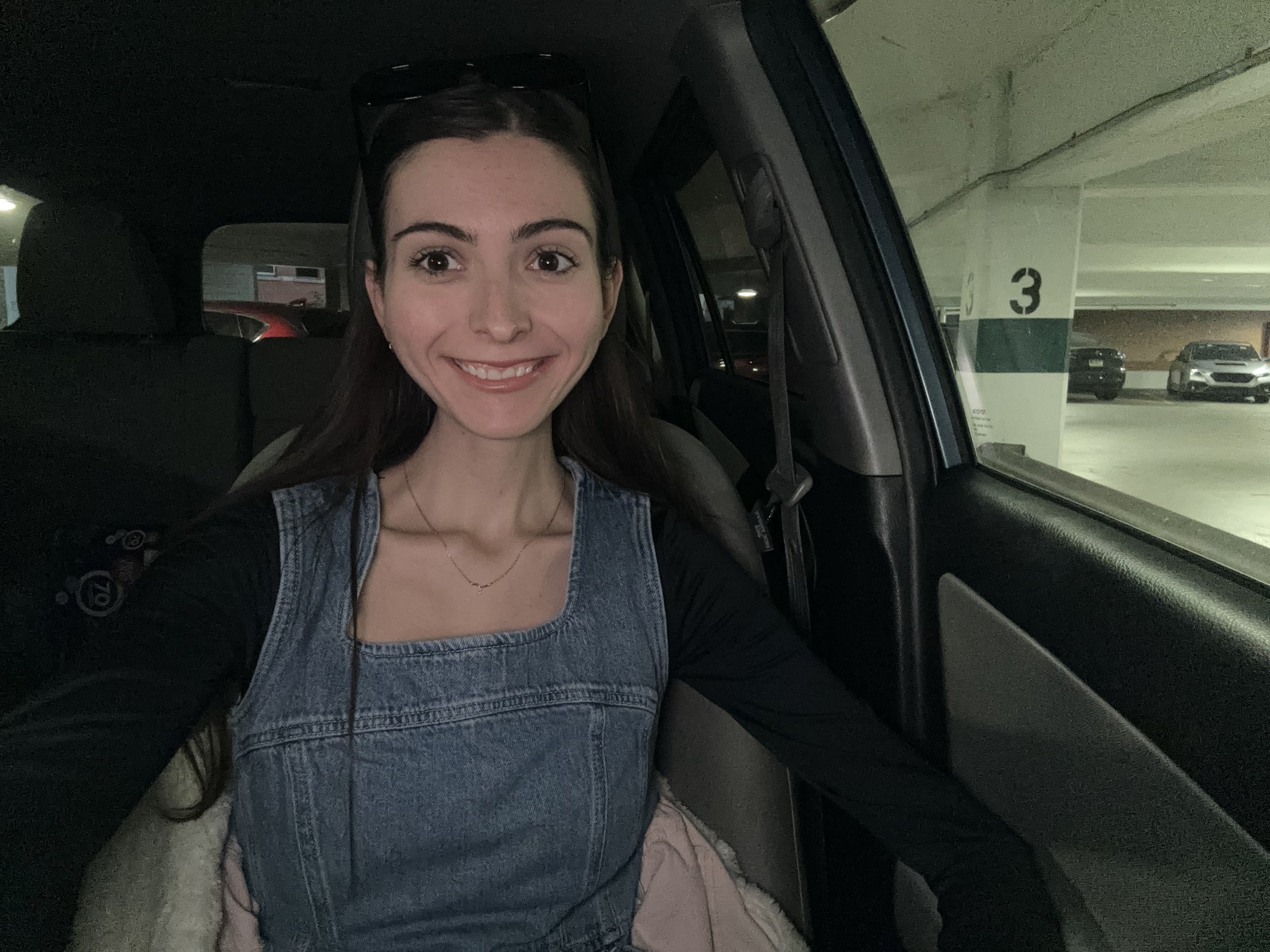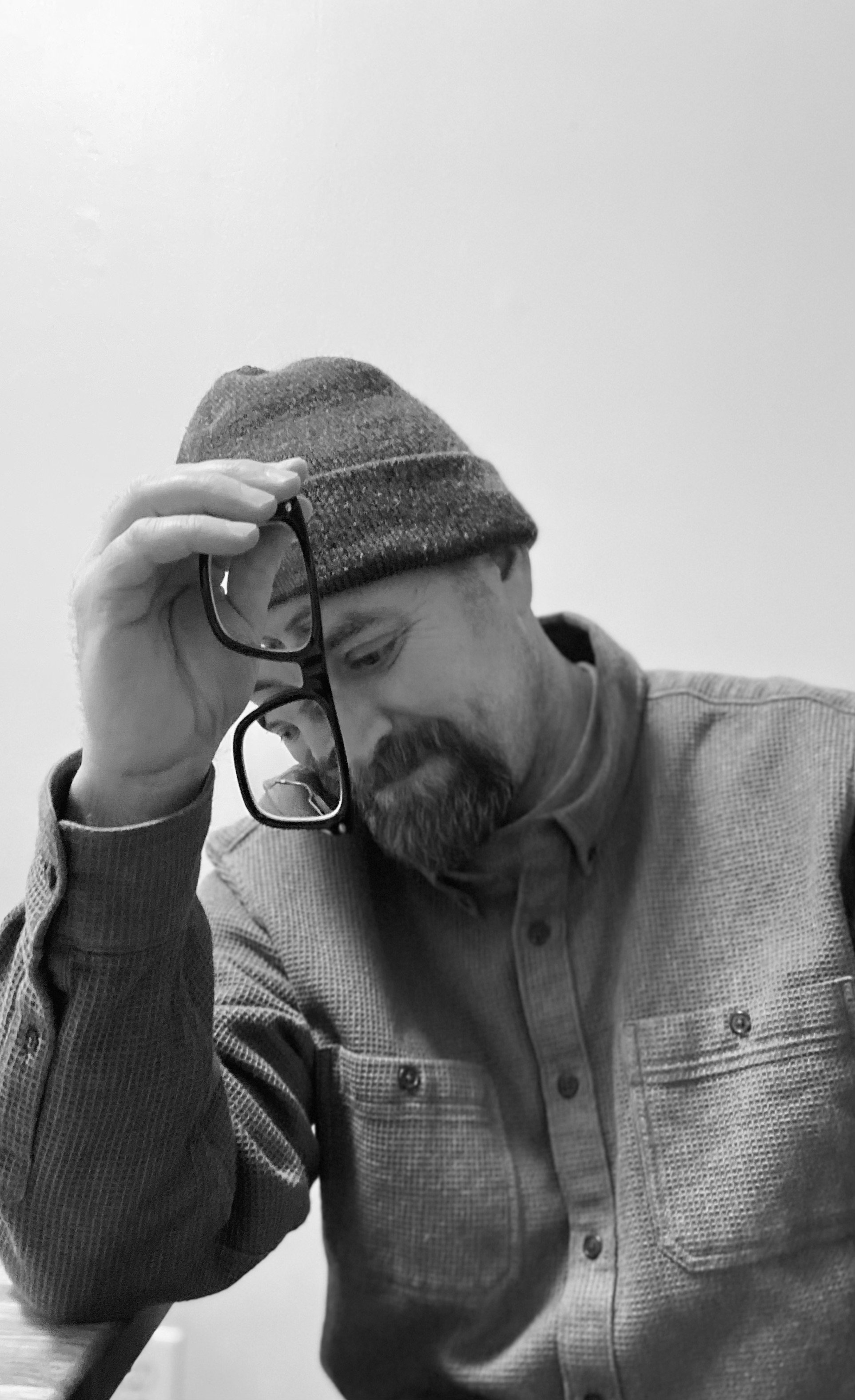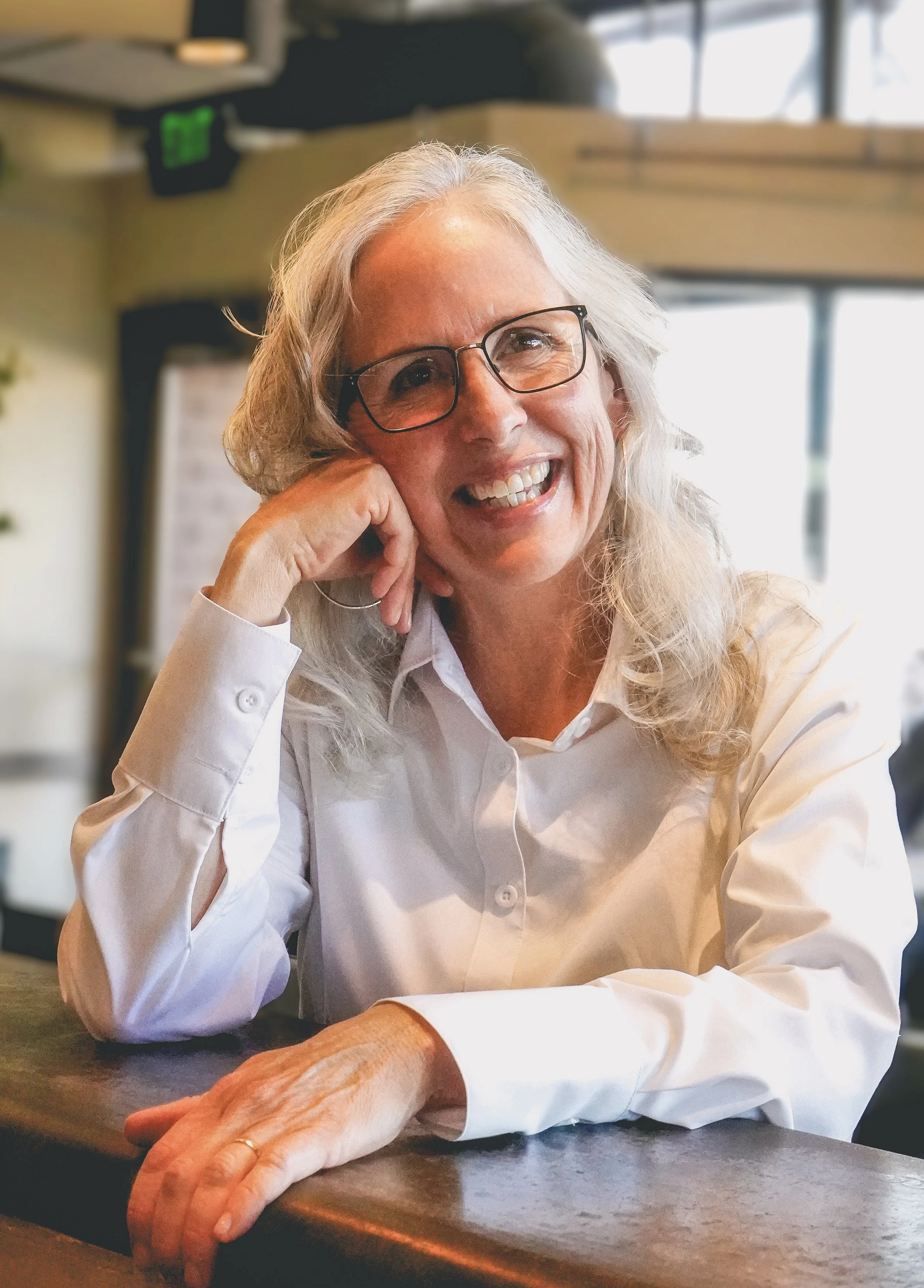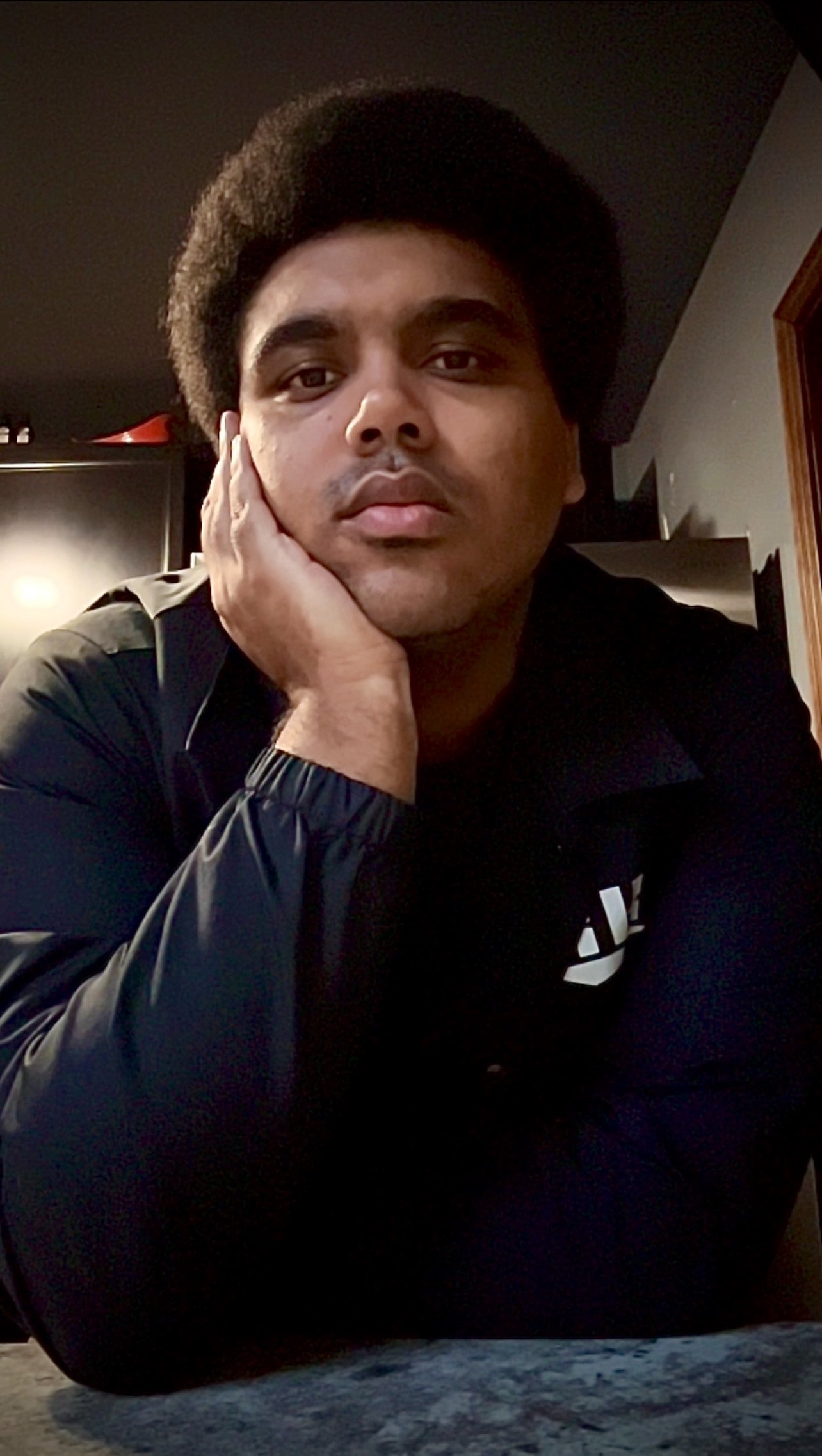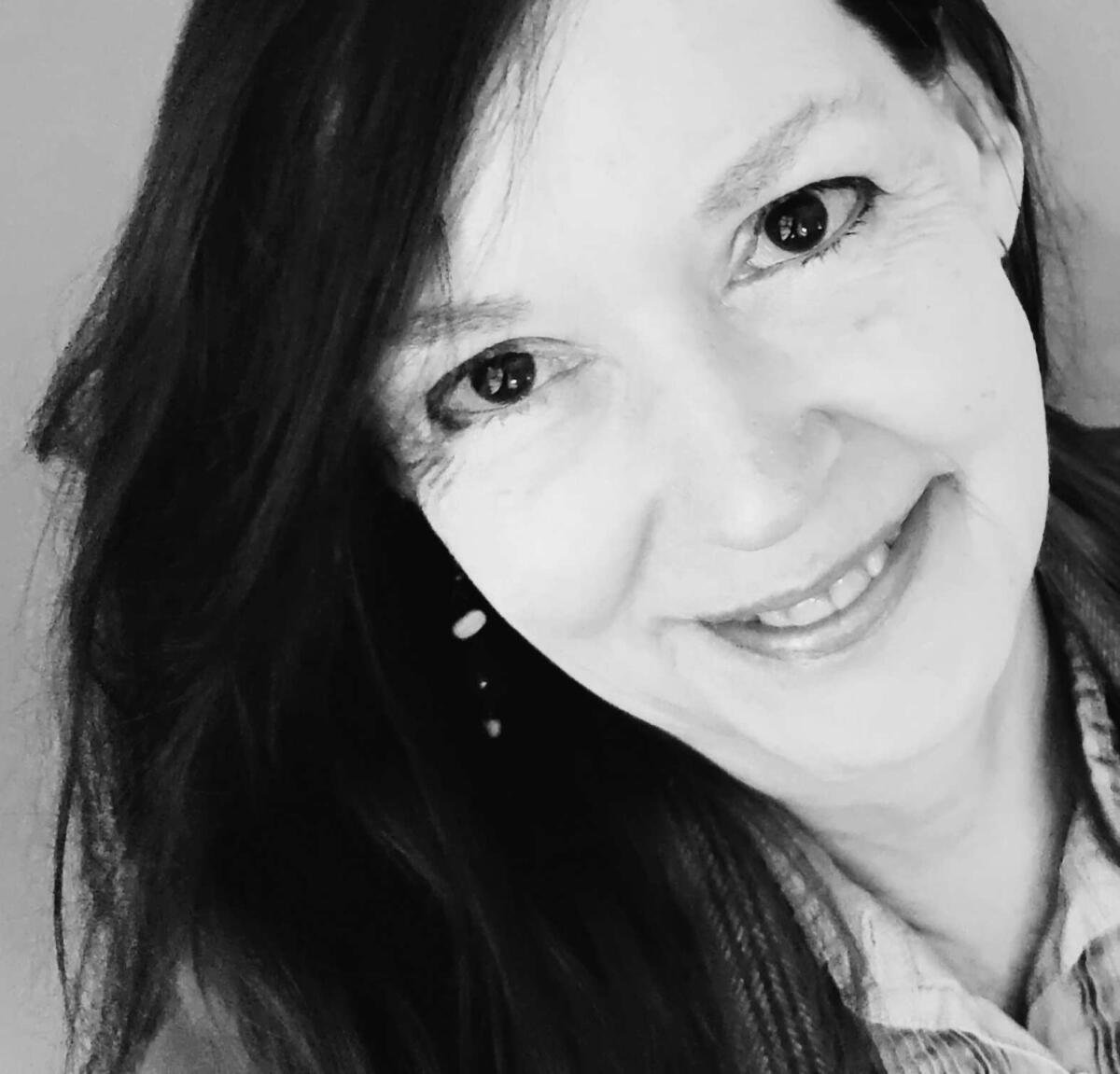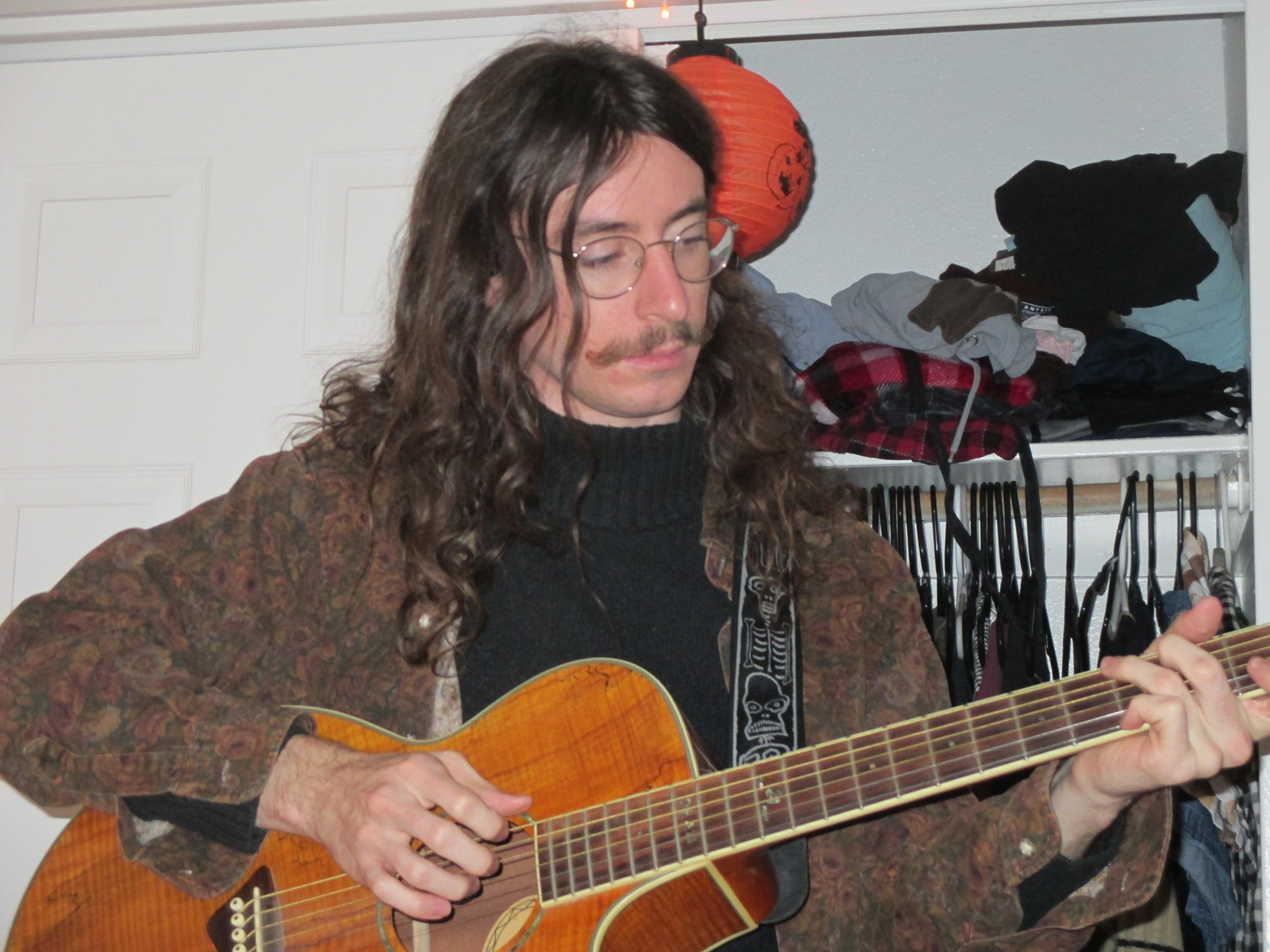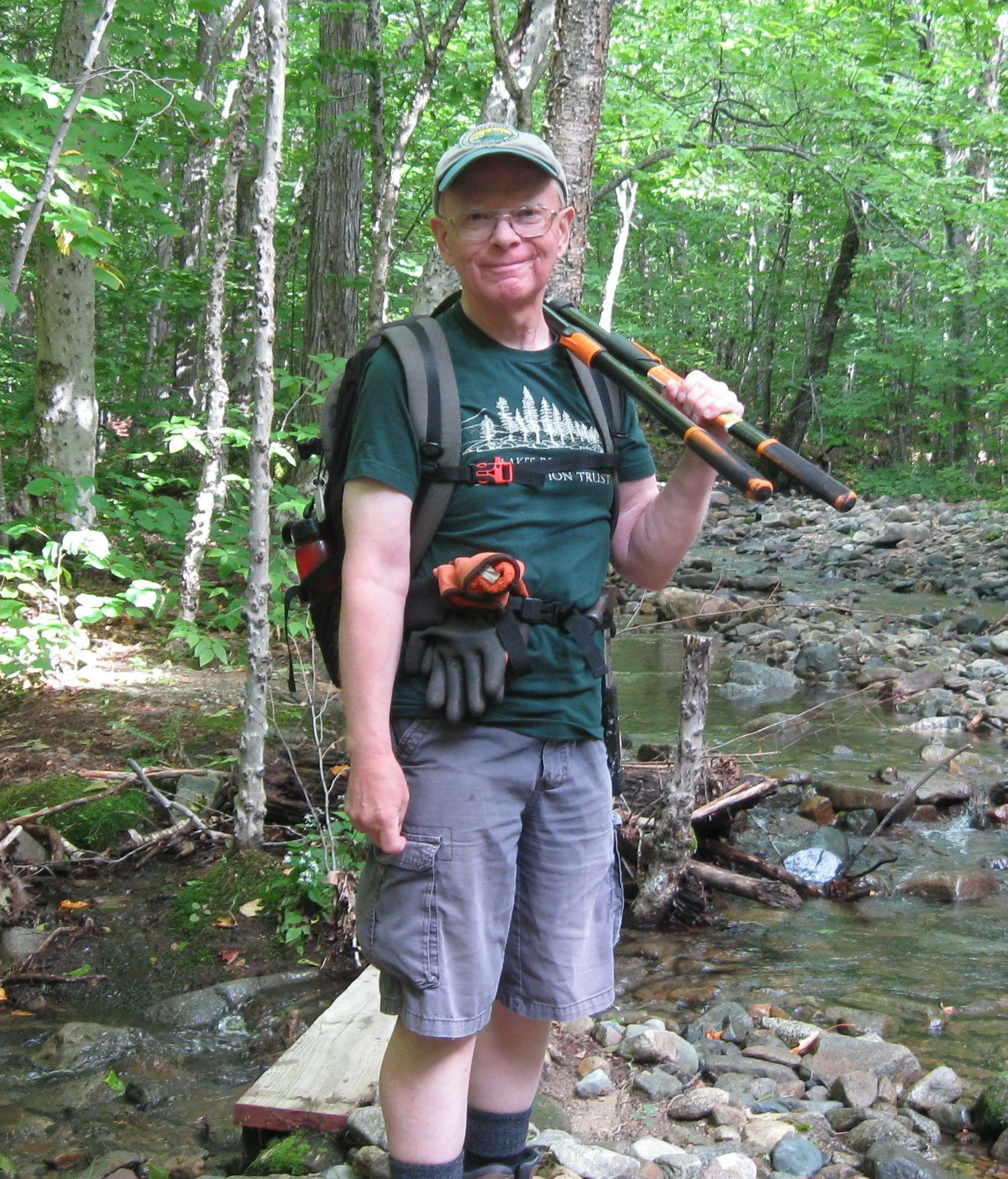Issue #27.1 A Triple Issue: Harold Bowes, Harrison Fisher, and Julie Sumner
A Poem by Harold Bowes
Day of the Dead Bar
We are anxious arriving at the airport a little late to pick up our daughter who is visiting for a few days
We are hopeful driving down from airport hill daughter in the backseat like it used to be
We are pleased as she passes forward a gift, candy shark teeth in a tin like Altoids
We are expectant stopping at the new bar downtown that has a Day of the Dead theme escorting her inside
We are watchful sitting at the table drinking Pacifica beer looking for a reaction
We are hinting at what a great place this is, like nothing she has living In Vancouver
As though one bar with outstanding Day of the Dead decorations could convince her to move home
I hold a ceramic salt shaker shaped like a human skull and roll it in my palm shaking out the grains
onto the table top My soul is a blue boat adrift I scatter shark teeth on the ocean floor
We were heartbroken
We were lovestruck
________________________________________________________________________________________
Harold Bowes is the author of Detached Palace Garden (Ravenna Press, 2017). Harold’s poems have appeared in elimae, THRUSH Poetry Journal, alice blue, SOFTBLOW, Portland Review, DMQ Review, failbetter, and many others.
________________________________________________________________________________________
Two Poems by Harrison Fisher
I Ran All the Way Home
The transistor radio was born two months before me, retailing for $49.99, about $360 in 2020 money.
I had one by 1961, as much a relic today as an incunabulum. I listened to doo wop after bedtime,
under the covers,
weighted with a practiced sadness that started somewhere far away, coming to my street
gleaming with night rain, the sound in my ear like dark, empty stretches
of distant landscape, field, riffled by tornadic falsettos.
Your Name on a Grain of Rice
I stand on a corner as a city bus goes by. Through the filthy window I see the silhouette of a passenger with antlers on his head.
He is the Stag Man, all right, riding on to a sub-sylvan frolic, a quick coupling with a doe-woman in brush that comes after
the route’s turn-around, an area of squalid ghosts and immaterial stinks that marks the end of the line.
On our side, feeble civilization. I step onto his side. I am trying to think Apollonian thoughts, but I feel Dionysian.
This is the stag’s lot. Surround me the subspecies, the singing dancers. They sing, they dance.
They feed.
________________________________________________________________________________________
Harrison Fisher has published twelve collections of poems since 1977, four of them book-length: Blank Like Me, Curtains for You, UHFO, and, most recently, Poematics of the Hyperbloody Real. After a hiatus from writing and publishing for most of the 21st century, Fisher has new work appearing in 2025 in All Existing, Amsterdam Review, The Basilisk Tree, Chewers by Masticadores, The Corpus Callosum, eMerge, the engine(idling, The Kleksograph, Misfitmagazine, and Rat’s Ass Review. He is retired from public service and living in upstate New York.
________________________________________________________________________________________
Two Poems by Julie Sumner
Lament for Falling for It All Over Again
Genesis 3:4-5 Then the serpent said to the woman, “No! You will not die! God knows in fact that on the day you eat it your eyes will be opened and you will be like gods, knowing good and evil.”
I would have fallen for it, too, wouldn't you? That knowledge that gleams as good also revels in the evil it reveals. My curiosity, a moth lured in by the brightness of the thing, makes an easy prey. The next post, next podcast, next newscast will finally explain it all–at last. And so I fly right into the burning frame of light, the wings of my mind blackening to match the night. No god am I.
Too late, like Eve, I realize that like only ever means like. A facsimile, a resemblance, the way a hummingbird moth is still only insect despite the hum, the blur of wings, the glint of emerald green. Its life only a summer season, it travels merely from shrub to purple-flowered shrub rather than embark on any grand migration across the sun-spattered gulf. Moth remains moth and never becomes bird. And we become like gods only in our knowledge of what we are not.
A Lament for What the Ground is Forced to Swallow
Genesis 4: 10-11 JB “What have you done?” Yahweh asked. “Listen to the sound of your brother’s blood, crying out to me from the ground. Now be accursed and driven from the ground that has opened its mouth to receive your brother’s blood at your hands.”
As I sink my spade into this flank of clay just south and west of Shy's Hill, I remember that I am not the first to disturb this dirt. Beneath this suburban turf lie battle-scars deeper than the limestone, the blood from that old war by now swallowed down by aquifers, stubbornly staining even the groundwater. A boy rides by on his bicycle, waves. And I wonder what Yahweh hears now as I pray–are my prayers the only ones rising from this particular acre? Or are they joined by the soldiers' cries as they were slaughtered–like the water and the blood mixed together?
________________________________________________________________________________________
Julie Sumner is a writer who has worked as a critical care nurse, liver transplant coordinator, and massage therapist. She now teaches creative writing, focusing on reading poetry and writing as ways to develop resilience. Her poems and book reviews have appeared in Pine Mountain Sand & Gravel, Delta Poetry Review, The Intima, Relief Journal, The Englewood Review of Books, and elsewhere. Her chapbook, Meridian, was chosen by poet Jane Hirshfield as the winner of the 2023 Wildhouse Poetry Prize. Her website is www.juliesumnerpoetry.com.
________________________________________________________________________________________
Issue #27.2 A Triple Issue: Megan Williams, James H Duncan, and daniel joseph
A Poem by Megan Williams
Expiration Date
Sunsets feel precious since I know any could be my last. The knowledge does not come from diagnosis– no confirmed sickness spreading through the empty halls of my body, no doctor who told me X more months until the dirt finds me. Unsure of my sureness’s source. When I was fifteen, I walked everywhere with Plath quotes tucked in my socks. Never left home without. Ask me to untangle that thought process & I can only hand you one hundred necklaces of dread knotted together. I thought it would be funny for the coroner who received my body to remove my sneakers & read Dying / Is an art, like everything else. He’d go home with a good story: hi honey, a little dead girl today, yes how sad, but it’s like she knew what was on the horizon for her, & prepared for it exceptionally well.
________________________________________________________________________________________
Megan Williams is a writer in Pittsburgh, PA. Most recently, her work appears in The New York Times. Tweet her @megannn_lynne.
________________________________________________________________________________________
A Poem by James H Duncan
All Our Futures in Morning Light
tulip beds in the park trampled down to one yellow flower angled toward the summer sun, churned soil and footprints from the escaped protestors the night before, police barriers in the morning dew glisten with silence, no one left here to remember the plight, reasons, or aftermath / single tulip aching blind for the sun
________________________________________________________________________________________
James H Duncan is the editor of Hobo Camp Review and the author of Both Ways Home, Nassau, and We Are All Terminal But This Exit Is Mine, among other books of poetry and fiction. He currently lives in upstate New York and travels to review independent bookstores for his blog, The Bookshop Hunter. For more, visit www.JamesHDuncan.com.
________________________________________________________________________________________
A Poem by daniel joseph
all over, again
i remember my simple anger at the evil of people. i remember pulling out my eyelashes at the clay feet of their cruelties. i remember slipping my broken teeth into the silk-lined pockets of their horrowshows. i remember passing long letters to their titans about the sides of history judging such iagos.
oh, i remember my idea of history, of its sides, speaking something, anything to evil. oh, i remember my idea of people reading iago as a villain.
now, i don’t wipe the peanut butter from the knife before going for the jelly. now, i don’t look too closely for mold on the old english muffin i find on top of the microwave.
no. now, i eat dripping sandwiches in my dusty pajamas & knit hat, dancing like monk around my kitchen table, chanting my poetry to the jelly-stained walls, making laugh the mice who came out of hiding a generation ago.
no. now, i twist in my broken slippers, rubbing my toes bloody on the cracked linoleum, wishing i had bought flowery curtains,
for the world outside kills itself every day in my picture window
& i can’t help but watch the bird i love that little black-capped chickadee with the big voice bleed out on the sidewalk all over, again
all over, again.
________________________________________________________________________________________
daniel joseph writes from a river valley. his most recent work can be found or is forthcoming in Passages North, Biscuit Hill, and HAD.
________________________________________________________________________________________
Issue #27.3 A Triple Issue: Meghan Albizo, Jade Sham, and Caleb Edmondson
A Poem by Meghan Albizo
Spectacle
I’ve been reading this Frenchman’s ideas from 50 years ago, reality and image image and reality.
I think about this in the shower, putting vegetables into my air fryer.
Wondering while I stare at my lines with 7X magnification: Do I need botox? Is it too late? Will retinol work for me?
I consider myself Smart, not easy to “influence.”
Cool because I don’t have a TikTok, while excusing my other presences.
I am still in the know though.
I know about trends. I know about bubble skirts. I know about the white and grey and cream interiors. I know who is cringe. I know who has rizz. I know that rizz is slang for charisma. I know that slang is to be avoided to not date myself.
But did
I ever
ask why?
________________________________________________________________________________________
Meghan Albizo is a writer of non-fiction memoir, fiction and poetry. She was born in California, studied English and Biology at Missouri State University, explored the Pacific Northwest and currently lives in the United Kingdom with her partner and child. Her work has previously appeared in The Hemlock Journal and she has upcoming publications in Audi Locus and Querencia’s Quarterly Anthology.
________________________________________________________________________________________
A Poem by Jade Sham
December
They’ve turned the radiators on and the first cold of the season has settled into my lungs.
It is easy now for ghosts to slip in.
A professor asked, once, for a metaphor for grief and I said it was a moss grown over everything. Not a lie, but something easier and almost true.
The neighbors have lined their gate with dollar store tinsel and garish red garlands. My throat is thick with phlegm. I live in a place you’ve never been.
The truth is: grief is a light I’ve seen— cold and cruel and burning— and all the world’s a veil I’ve pulled back over my head pretending I’d never seen the truth to begin with.
________________________________________________________________________________________
Jade Sham is a writer originally from Plano, TX, now residing in Brooklyn, NY. Her work has previously been published in Pithead Chapel and Under the Gum Tree, and is forthcoming in Wig-Wag. You can find her on Instagram @/jadesaraa and on Substack at jadesham.substack.com.
________________________________________________________________________________________
________________________________________________________________________________________
Caleb Edmondson is currently completing his MFA studies at Bowling Green State University, where he teaches English and Creative Writing. His words can be found in Bending Genres, Strange Horizons, and Paraselene, among others. A lifelong Ohioan, Caleb enjoys the flatness of cornfields, and the ups and downs of the Cuyahoga Valley—which he considers home.
________________________________________________________________________________________
Issue #27.4 A Triple Issue: David Salner, Ellis Purdie, and Maureen O’Leary
A Poem by David Salner
An Infusion
Not too bad, he said, because this is the sweet time, while the last infusion finds its way through the body before it changes blood and bone to pain. He was packing for the move to his daughter’s house in Coatesville, where she’s a nurse, and we were standing beneath the myrtle whose blossoms were already changing red to gray. Mosquitoes left over from summer hummed in the shadows.
**
After he’d driven off and thanked me for the little I did I tried to remember what Schubert said about pain, that under the guiding hand of discipline it leads to beauty, but in its pure form pain tells us only of grief, a subject on which we’ve learned enough.
**
Schubert, again, wrote that pain sharpens the mind, which I doubt very much, though I suppose if you’ve never sat with it for an hour trying not to cry out, you’d know nothing about despair, you’d be unaware of what the new day means after tossing all night.
**
Can we feel the pain of another, asked the creator of Ave Maria, of all that beauty suffused with pain?
________________________________________________________________________________________
David Salner’s most recent books are The Green Vault Heist and Summer Words: New and Selected Poems. Both appeared in 2023. His award-winning debut novel is A Place to Hide (2021). His writing also appears in Threepenny Review, North American Review, Ploughshares, and Valparaiso Poetry Review. He’s worked all over the country, as iron ore miner, steelworker, librarian, baseball usher, and in many other trades.
________________________________________________________________________________________
Two Poems by Ellis Purdie
Sweep Her
Sunday, and service over, I want the quiet of home, but instead I chase my son in the large sanctuary this church no longer uses, membership down, congregation too scattered among the pews to feel kinship, our body the one locals insist will perish soon.
Then, behind the baptistry glass, two older boys with the music minister pass through, and suddenly, my son needs to see it, too, witness empty basin where last baptism took place almost ten years ago. I am eager to leave, but when the boy gets an idea
he races for it. I tell him we can’t, we need to go home. Begging begins, and I listen, argue and then relent, sigh bitterly and say, Let’s go. Waste our time. Nothing to see. Upstairs, old door’s closer creaks, baptistry dim, tile littered with roaches on backs,
dust, skeleton of an anole, and like a tour guide, I present these dead, pick up the lizard hardened to leather, say with a mean charisma here is what happens when the church dies, son, sorry the moment I say it, the empty sanctuary before us in the pane.
I am Moses to the people, striking a rock to slake son’s thirst, causing our banishment from the Promised Land, suddenly sure I want a full sanctuary as badly as I want to go home, but not to sow nor shepherd, lacking altogether a boy’s persistence to get it done.
Safety in Dismay
No Latter-day Saint, but I would be a liar if I said I didn’t like the doctrine of eternal family, still a father and husband to these whom I worry over all the time, and finally, our getting to be each other’s without threat of sickness, death, broken bond. I struggle with the thought of my son and daughter resurrected, seeing me and saying, He was my father, now not. My wife, There is one I loved, most days, our covenant now done. Will we then even sit together, remembering whose we were? Yesterday, I walked the dog and children to the cemetery down the street. Daughter asleep in stroller; son sitting on wall bordering headstones, rapt in video game; dog on his back, joy-tossing in newly-mowed grass; I lifted slabs of concrete and crumbling brick, Searching for an unlikely snake in warm fall. Wind moved through the pines, all else quiet otherwise, and I wondered if Sheol’s garden, or heaven, would be this way, no body under stone ever again, my not-children in no need of my stewardship, but knowing I once did steward them, all of us aware of who helped us find this place, grasping a truth I could not before: there is better than permanence in law, blood, a last name, or a home. Though again, I would be lying if I claimed that even in such a time I would never ask you to sit with me in the garden, sunlight shimmering through branches, kingsnake under rock overturned, and remember those days gone, days somehow we would now not return to, even if offered.
________________________________________________________________________________________
Ellis Purdie graduated from The Center for Writers at The University of Southern Mississippi. Previous work has appeared or is forthcoming in San Pedro River Review, Red Rock Review, Ekstasis, Puerto Del Sol, Riveted, jmww, Reformed Journal, Talking River Review, and Cottonwood. He lives in east Texas with his family, where he teaches and is often looking for wildlife.
________________________________________________________________________________________
Two Poems by Maureen O’Leary
Queen Mab in Love
I turn inside out without
My own consent I tear
These walls to shreds I burn
Down houses and I crawl into
The lion’s mouth.
I want to open the universe with my
Bare hands and fall into the
Void (the void is me the void is me)
I’m a grabbing hand
I’m the negative space that will hold you
Too tightly and love you too much
I will be too close to you I will set
My wanting loose
A whirl of debris
This is she
Oh this is she
Menopause II
I am most dangerous where
I am lonely
The permafrost is melting
You can talk now
I’m melting, I’m melting,
I’m burning away the
Detritus that confined me
What is left but all this
Blood all this iron all this
Stone.
________________________________________________________________________________________
Maureen O’Leary lives in California. Her work appears in Nightmare, Chthonic Matter, Bourbon Penn, Sycamore Review, Electric Literature’s Recommended Reading and other places.
________________________________________________________________________________________
Issue #27.5 A Triple Issue: Erin Arnold, Nathan Fako, and Brian Michael Barbeito
A Poem by Erin Arnold
WHAT THE FUCK IS A CULVERT?
I learned my words by reading them. I don’t know who taught me how to read. I wonder if I had a recollection of a warm bedtime story if my vocabulary would be more well-rounded. I knew the word ‘apartment’ and I knew that we couldn’t go to the complex pool because to get to the pool you must go past the office and the person in the office would ask about the rent check and I knew the word ‘eviction’. I knew that ‘home’ didn’t always mean ‘permanent’. Vocabulary lists are developing lifelong but so far nobody has been able to explain to me about a culvert. Maybe vocabulary is situational and if I had known ‘cul-de-sac’ earlier I would have also learned ‘self-assuredness’ or ‘security’. I had a friend who had her own pool in her own backyard of her parent’s own four bedroom colonial and from her I learned ‘entitlement’ but also ‘generosity’. I’ll bet she could have taught me about a culvert if after junior year I hadn’t learned ‘lost touch’ after my repeated lessons on ‘self-preservation’.
________________________________________________________________________________________
Erin M. Arnold is a poet living in the Chicago suburbs. She has an MFA in Poetry from Lindenwood University and her work is scheduled to appear in Gargoyle Magazine and the SHINE International Poetry Series in early 2025. She can be found online at erinmarnoldwrites.com, on Instagram @poetwithpostcards, and on Bluesky @erinmarnoldwrites.bsky.social.
________________________________________________________________________________________
A Poem by Nathan Fako
Elegy for J
In the crowded faculty room your name was spoken a stone dropped in the well of my throat and the part of me most resembling my father knelt to lift a thin green ribbon of grief. I heard the sound of your skateboard on my classroom carpet years before when I said I could ollie, once and you said bullshit.
I wonder if they buried you in that ochre beanie I never saw you without. I wonder if the gun still weeps, or if your parents had it melted down. You were a green-eyed boy who loved ferrets, had plans, and they’re ruined now the way each thing is. You walked into the hum of a hollow, heavy bell, and now the sludge of hours slouches forth without a mouth to speak your name. I wonder where your ferrets have gone. I’ll write to you there.
________________________________________________________________________________________
Nathan Fako (he/they) is a former high school teacher. He currently lives in Ohio and is part of the MFA program at Bowling Green State University. His work is forthcoming in West Trade Review, Whale Road Review, and other wonderful places like this one.
________________________________________________________________________________________
A Poem by Brian Michael Barbeito
45 Degrees North East, The Song of the Angels Heard
the canon of spiritual literature says you might do better to ask, the angels for help. so I’d been asking in writing and in prayer. then I heard their song, two different songs. I could not decode what the songs said. I almost did. it was like being up from the shore and about to see the sea, but then the sea disappears and you are standing in a boulevard or promenade. something like that. or, you are in another room and think you recognize a sound, a visitor or a, again, song, but when you step closer you mistook the song or person. but, I know I heard their songs, and it was also like singles from a new collection of old tunes, revisiting something old or else on a parallel reality track, another dimension. I could sense the song leaving, both times, and thought, - I am now not going to be able to figure out what the song was.- I just stood up and let it be, accepted it. they know my intention, and they and their higher-ups, management, I would think know when to allow more songs. when I was a kid I played at Don Valley Hockey Rink and our sponsor was once called Cole Sherman and once called Camsten or Cansteen or Cansteel Leasing. The first shirt was blue and the second jersey red. I was first number two and then number four. one day on the blue team I realized the game had ended and I didn’t fall down, had stayed up the whole game. It was an accomplishment. I never told anyone how proud of myself I was. I didn’t score a goal but didn’t fall down. I was getting there. They since changed the name to Oriole Community Centre. hearing the angels but not the whole song was like not falling down but not scoring a goal. come to think of it, it’s interesting. they held a meditation class there years later and I went a few times. it was nondescript, nondenominational, harmless. I knew because I studied all those things. the lady had a book by Leadbetter or Leadbeader,- the man who discovered Jiddu Krishnamurti. she was astounded that I knew who this figure was. I had read somewhere that he had travelled far and wide to find a cloth or textile of a certain shade of blue. maybe it was a spiritual blue and/or it appeared to him in a dream. so you have to work on it,- finding these things…finding colours, listening to angels, leaning to skate, heck…learning life. there is around there The Peanut Plaza, where I used to get my hair cut, go to Consumers Distributing Store, buy a toy,- a GI Joe tank or truck with an action figure. that’s a rough place. always was a bit rough. but nobody bothered me. I write this as some compass auto magically showed me the direction I face,- 45 degrees North East. this is where I was meditating when I heard the angel song. I’ll definitely have to try that again. I’m hopeful, positive about it all, and grateful I that I’ve made the progress that I have.
________________________________________________________________________________________
Brian Michael Barbeito is a Canadian poet, writer, and photographer. A second book of prose poems and pictures, When I Hear the Night, is forthcoming from Dark Winter Press (May, 2025).
________________________________________________________________________________________
Issue #27.6 A Triple Issue: Patrick T. Reardon, Julie Benesh, and Eric Colburn
A Poem by Patrick T. Reardon
Double
Denmark Jones had a swan mother and the look of a startled raven.
Levers were pulled for his summer city sewer job.
He studied the book of two lizards, creators of plants and animals, living things to eat and not eat according to tenets.
Even when walking forward, Denmark was backing away from the throne.
He knew himself to be a shadow.
East star, west star, he studied the book of the trickster, last born of all creation, breaking a path across city streets in the symphonic blizzard, seller of birthright for red stew, buyer of 12 sons, a daughter and a wrestling match at the ladder.
It is true that Denmark was the son of sky and soil.
It is true that the twin tripped Denmark on that August firefly night, the white scar on the knee now still.
It is true Denmark was born grieving.
________________________________________________________________________________________
Patrick T. Reardon was a Chicago Tribune reporter for 32 years. He has published six poetry collections, including Darkness on the Face of the Deep and Puddin’: The Autobiography of a Baby, A Memoir in Prose Poems. His newest collection, Every Marred Thing: A Time in America, the winner of the 2024 Faulkner-Wisdom Prize from the Pirate’s Alley Faulkner Society of New Orleans, is available from Lavender Ink. He has been nominated five times for a Pushcart Prize.
________________________________________________________________________________________
A Poem by Julie Benesh
THERMODYNAMICS OF GRATITUDE
It's true what they say about entropy: it takes more effort to make a mandala than to kick it into the surf; it's a conundrum
to determine the deterrent, that tipping point that spurs immunity, unless, to parrot Pareto, it's 80%, or is it the 25% that elevates outcasts
to outgroup? They also say no one is paying attention to you (meaning me) but I beg to differ. I think they mean the way AI deems my headshot a 6/10 but confidence
is key: I feel offended until I remember I'm old, then smug, then neutral, remembering this is as good as it will ever be. Homeostasis. They also say that bullies’ targets
can’t read a room when the real problem is we’re busy reading when we should be fighting, fleeing, or fawning. And everyone
is scooping up everyone else’s data; just because you’re average doesn’t mean you have no stalkers.
I dreamed I was harassed out of yoga class for missing a cue, and I yelled that that was not how yoga worked,
and my nemesis saved me a spot on the floor. The paradoxical theory of change says to embrace that monstrosity,
that mutant what is, calling from inside your house, not to fling it down the commode like a menstrual clot. Quarks are invisible in isolation, yet their interactions
weaken as distance diminishes. Sometimes there’s no one left to blame, and I must thank every crude, accrued catalyst of that creature−divine, discerning−I must bear to become.
________________________________________________________________________________________
Julie Benesh is author of the poetry collection INITIAL CONDITIONS and the poetry chapbook ABOUT TIME. She has been published in Tin House, Another Chicago Magazine, Florida Review, and many other places, earned an MFA from Warren Wilson College, and received an Illinois Arts Council Grant. She currently lives in Chicago and holds a PhD in human and organizational systems.
________________________________________________________________________________________
A Poem Eric Colburn
American Traumas, American Dreams
The streets are wet; the sky was crying. Its tears have stained the tree trunks black and sent the pigeons into hiding, and children want their childhood back.
They pause at play, unsure what voice just spoke inside their chests, what song just sang, unbidden, of a choice they didn't know they'd chosen wrong.
A fluttering of wings, a coo; the happy children here are chasing you.
________________________________________________________________________________________
Eric Colburn's poetry has appeared in Appalachia, Blue Unicorn, THINK Journal, and elsewhere. He lives with his family in Cambridge, Massachusetts.
________________________________________________________________________________________
Issue #27.7 A Triple Issue: Joshua C. Pipkins, Terri McCord, and Bart Edelman
A Poem by Joshua C. Pipkins
Talking Wounds
how do i address the talking wounds? the gash on my inner thigh. the open sores beneath my hair. the bones bulging from my feet. i whisper to their ears. they have tongues. they say that where there is silence there is silence and where there is obedience there is silence and where there is a king there is silence always because kings don’t like to hear talk back. they know this because they each complain to me, and i never listen. when i run they say to stop stop stop. when i eat they say to throw it back up. when i pray they say to stop stop stop. when i sleep they say i’m not doing enough. in the shower’s constant pattering patter patter there is a rage. i tell the rage that i’m sorry. i’m sorry for doing anything but what i’m told. i’m sorry that i will do more anything until there is nothing left to be done. then i might listen. when there is nothing left to be done.
________________________________________________________________________________________
Joshua C. Pipkins is a pushcart nominated poet based in Memphis, Tennessee.
________________________________________________________________________________________
A Poem by Terri McCord
Snow Moons
“The moonlight’s so terrible,” Emily in Our Town
This is winter in name only beyond a season or seasoned as almost everything seems to be itself in name only having evolved to something more and, as of yet, unnamed.
The shadow colors the dog a phthalo blue against dark gray walls, and the police car light strobes the street and the neighbor’s yard and my arm near the window.
I look but am taken this warm month with the Snow Moon, also called Bear Moon, Bald Eagle Moon, Goose Moon, that seems to sway slightly from side to side hypnotic I can
almost hear close your eyes. Listen to my voice. I imagine the ghost of you to be that huge and beg to be touched. You had a trick, or a gift, of beginning to laugh and your eyes almost could roll completely backwards in your head, your eyes like two sand dollars, your eyes like two moons. I am listening.
________________________________________________________________________________________
Terri McCord is a visual artist as well as a poet. She has work forthcoming in The Westchester Review, Chiron Review, and Gargoyle. Her poems have received Pushcart nominations as well as Best of the Net (including 2025). She loves imagery and responding to the natural world and all of its connections. She likes encouraging communication skills and she loves playing with language.
________________________________________________________________________________________
A Poem Bart Edelman
Anyone’s Guess
Tether your feet to the ground; At least it’s a start. Bend a bit at the knees— Careful not to hurt your back. Take in the surroundings You haven’t observed lately. Breathe at measured intervals, Until you get the hang of it. Briefly close your eyes, Just to see what fate May have in store for you. Sing a song of sixpence, Even if your rhymes are rusty, And there’s not a blackbird Within five-hundred yards— Let alone a queen to pout. Believe in the goodness of pie. Not to do so is foolish, Rather wicked, purely unwise. Where you go from here, though, Remains anyone’s guess.
________________________________________________________________________________________
Bart Edelman’s poetry collections include Crossing the Hackensack (Prometheus Press), Under Damaris’ Dress (Lightning Publications), The Alphabet of Love (Red Hen Press), The Gentle Man (Red Hen Press), The Last Mojito (Red Hen Press), The Geographer’s Wife (Red Hen Press), Whistling to Trick the Wind (Meadowlark Press), and This Body Is Never at Rest: New and Selected Poems 1993 – 2023 (Meadowlark Press). Most recently, he has taught in the MFA program at Antioch University, Los Angeles. His work has been anthologized in textbooks published by City Lights Books, Longman, McGraw-Hill, Prentice Hall, the University of Iowa Press, Wadsworth, and others.
________________________________________________________________________________________
Issue #27.8 A Triple Issue: Ben Fluet, Daniel Findlay, and Ron Riekki
A Poem by Ben Fluet
bug
after ‘Memories That Smell Like Gasoline’ by DW
i dreamt about a colony of ants living on the top shelf of my closet last night. holes bored into wood instead of sand-colored dirt or, rather, a sometimes hazelnut brown. wood only imitates in color. i struck a match and set fire to this colony, and the whole thing burned a putrid smell like scorched rubber almost, and i stirred myself awake and realized i’d trimmed my nose hairs before i went to sleep. while choosing a shirt, i felt a soot pile when the carpet moved under my feet. looking down, living ants were slightly charred, crawling up my ankles, and i biled up my form. patronized into saints for survival. it hurt so badly that i started crying. David called and asked to meet for coffee. mid sip on the sidewalk curb, he told me he got the bug, and at that moment, i upchucked my body again. our forms were just made sick from the start. nothing perfect. keeled over, over and over, David had said something else about knowing he wasn’t going to die and everything would be okay, but i’m not sure i’d want to stay alive anymore, i hardly want to do that now. all the televisions gossiped about new treatments and it being all right to cry if you wanted to, but every nurse’s uniform looked like graying dog shit, and no one told the truth about how the lesions looked ugly. it’s just a bug crawling upwards from your feet to your stomach.
________________________________________________________________________________________
Ben Fluet is a queer poet, journalist, and filmmaker from Richmond, Virginia, currently living in New Orleans, where he is pursuing an MFA in Poetry at the University of New Orleans. In 2022, he hand-bound and self-published his debut chapbook, "How We Forgot to Sing," and is currently a reader for Bayou Magazine. In 2020, Ben directed "Meet Me By The Magnolia Tree," a documentary exploring the history of gay men's lives in Richmond, VA, aired on PBS and featured on Virginia Public Media. His recent poetry appears in Otis Nebula, and you can find him on Instagram @beanspasms.
________________________________________________________________________________________
A Poem by Daniel Findlay
Ekphrasis #585
Morning - mom’s up, hands me an orange.
I spin it on the table and suddenly it’s far away
like I imagine Jupiter once was before the telescope.
I bring it close, swing it up to my nose in a smooth arc,
breathe in. A sharp scent like May slashes forward.
Missionaries spreading the gospel orange, all the way from Jupiter.
Things flew by - time, mostly. As the years savagely
tore at my cells I lost my taste for citrus. In California
everybody grows oranges, or so I assumed, judging
from weather reports and county names. Too arrogant.
But Arnofilni’s oranges knew how to linger softly in the background,
Humble and serf-like, suspended on the windowsill or table
the way the Pleiades burn in place. They knew when to catch
your jagged attention - then let it go with grace. Let it go
back on its own orbit, bouncing right, up, then back again
to land on them and, this time, never leave.
________________________________________________________________________________________
Daniel Findlay is doing just fine, thanks for asking. He lives in Oregon and writes poems while his boss isn’t looking. His work has been featured in HAD and Stone Circle Review.
________________________________________________________________________________________
Two Poems by Ron Riekki
Writing about my loneliness will not bring me any closer to being married
I remember when I’d walk home from elementary school after basketball practice, the sun fading, looking down at my shadow and being just a little bit afraid of it, and I realized that nighttime was the earth’s shadow so it must go everywhere the earth goes.
My brother looks at the snow and says,
Cocaine. Could you imagine if that was cocaine?
So I do. And slowly I see this large straw descend from Heaven.
I tell my brother this.
He says, “You’re f-ed up.”
He’s the one imagining winter as a coke binge, but I’m the one who’s screwed up.
Later, we play Monopoly and quit before the end; otherwise I was worried we were going to die there.
________________________________________________________________________________________
Ron Riekki has been awarded a 2014 Michigan Notable Book, 2015 The Best Small Fictions, 2016 Shenandoah Fiction Prize, 2016 IPPY Award, 2019 Red Rock Film Fest Award, 2019 Best of the Net finalist, 2020 Dracula Film Festival Vladutz Trophy, 2019 Très Court International Film Festival Audience Award and Grand Prix, 2020 Rhysling Anthology inclusion, and 2022 Pushcart Prize.
________________________________________________________________________________________
Issue #27.9 A Triple Issue: Stephanie K. Merrill, Austin Allen James, and
Linda Lobmeyer
Two Poems by Stephanie K. Merrill
Tyranny Trauma
I’m losing the pages of Rachmaninoff while Schubert is hanging in the linden tree waving to my dead mother on the other side of the river. But it’s not her.
The tyrants are ruining our dreams.
We wake up sharing our nightmares: friends committing suicide, me hiding in public bathroom stalls escaping my stalker in fatigues.
Mike tells me his dream of the Audi falling apart, not able to get service, me stuck in a town across the state. He has a gun and is pointing it. Is going to use it--
then we laugh hysterically before we get out of bed tears streaming into this outrageous madness called today.
Seekers want to know truth while all the greedy people count their money everyone shouting everywhere screaming always something about opinions the tech bros scamming algorithms proclaiming the meaning of life.
We stumble through the latest news story all the while trying to allow vastness to touch us in the places where primordial wisdom reigns working to accept even the ugly dralas of reality.
We gather our strength to live on because somewhere in Kansas a wild horse is whispering and snorting the true word of God.
Midnight Cowboy Beginning With a Riff off Gerald Stern
I sing this for our old cat, Carlos, dead today and I sing it for our confused cat, Iris, who remains— our sadness now rising from the boxwoods sitting on our porches.
No more lonely mouth feedings crying at 3 a.m. No more cancer-riddled intestines wrangling your sleepy rodeo dreaming.
Early January. It is. Peeking sun. The white of. The red points flaming. The brim of ears. The love is so.
As in the world asks enough of us already. As in Source Energy surrounding us.
As in no more verses. As in no refrain. As in no more singing.
As in. You be carbon now.
________________________________________________________________________________________
Stephanie K. Merrill is a retired high school English teacher now living the writer's life. Her work has been published in a variety of literary magazines and journals; she has a full-length book of poetry forthcoming from Fernwood Press. Stephanie lives in Austin, Texas.
________________________________________________________________________________________
A Poem by Austin Allen James
Occam’s Childhood
I search for a manic bottle and a beacon appliance—some sense of a bi-directional refresh or wave break. One glance toward never ever and blank space is dashed to anti-hero and sequin dresses. Fresh dreams collect in concert lines—scars, bars,
and parachute visions haunt Edinburgh’s Rugby Stadium. I spiral back-to-back-to-back-to-back in dime store order the memory wrapped around the stadium with my daughter in pursuit of concert t-shirts. I find sanctuary in the music rife
in each moment of that line. Lunacy and bramble fast-forward, and the years fly by all Occam-like on the edge of an envelope attached to a comet strung with dust and gas and dreams in orbit. Try as I will to stop the rush
of descending stars, every generation has a yard alarm, and my daughter is now in the meadow of university students.
________________________________________________________________________________________
Austin Allen James is a Visiting Professor at Texas Southern University in Houston, TX. He has taught at TSU since the Fall of 2012. In 2016, Austin and colleagues formed a committee to create a “Professional Writing” concentration, which includes five creative writing classes. Austin is also a visual artist/sculptor.
Austin's undergrad degree is from Southwestern University in Georgetown, TX, and his Master of Fine Arts in Poetics is from Naropa University in Boulder, CO. His MBA is from the University of Dallas in Irving, TX. Austin actively writes poetry and submits poems weekly to journals. He is working on a book of collected poems, which is expected to be published in early 2026.
________________________________________________________________________________________
Two Poems by Linda Lobmeyer
Share Like Scroll
Take a minute. This might be your last chance! Ingest the rages you already share. Like so alike can like. Open mic. There scroll ‘til doomsday watching outrageous rants.
Consume this new idea. Click this gif! Lose 10 millstones with this recipe for disaster! Slim down so you can wear your old gnostic pants from high school. Diffuse the essential… Sniff
and saddle up for adventure on painted carousel horses. Enjoy circular scenes. Recycle misunderstandings. Meaning your circle knows more than the tainted--
Those privileged billions, those ugly villains, those septic souls on amoxicillin.
Send
Is it progress or regression to type his name? A curious tip toe wander on a forest trail through beams of old time. His data, a canopy above me. Like breadcrumbs, I snag with my thumbs his life scattered. I touch to click and observe safely hidden in shadows watching him, unseen.
Should I send a note? Say something to him? Or wonder, walking unseen through his forest? On a profile, his contact, a fork toward light.
In Oklahoma, I thought of you this May. So sorry to see your dad passed away.
________________________________________________________________________________________
Linda Lobmeyer writes from the edge of the middle in southwest Kansas where she was born. In her work she expresses a deep sense of place and faith. Her debut collection, When I Forget the Words is available from Darkly Bright Press.
________________________________________________________________________________________
Issue #27.10 A Triple Issue: Isabel Chenot, Colleen S. Harris, and
Patrick G. Roland
A Poem by Isabel Chenot
transfiguration
The wind that bent the sky up there was clear and bright. The spattered grass was writing someone’s name.
On every letter, elasticities of light writhed: field-tatter spiraled and became
a shining feather – molted from fire, hulled of its heaviness and its un-flame.
Turn now. Remember Sinai still igniting. Our flicked ash trembles and God’s breath flares gold
and grass is kindled like a dry wing.
________________________________________________________________________________________
Isabel Chenot has loved, memorised, and practised poetry all her remembered life. Some of her poems are collected in The Joseph Tree, available from Wiseblood Books.
________________________________________________________________________________________
A Poem by Colleen S. Harris
The Tattooed Patient Fears Needles
Two nurses laugh when I tell them I do not like needles, brows creased as they consider black scrolls climbing
my arms, panthers lounging lazy across my collarbones, letters skipping across my knuckles, roses in my hairline,
holding me together as much as sinew and bone. They hunt elusive veins, situate receiving tubes as I explain
that a tattoo machine (not a gun) looks less a needle than unwieldy calligraphy pen, more a poet’s tool
than torture device (unless you are the cramped artist holding the buzzing machine). Their vials remain empty,
my veins stingy, avoidant. They call a third, more skilled, to come coax a basilic IV into the pillow of my arm,
ministrations leaving me bruised like rotten fruit, my body’s biological defenses blown to pieces. I tell them
medical needles take, but the tattoo needle gives, sings as it stings, transforms this sorry meat into art.
________________________________________________________________________________________
Colleen S. Harris earned her MFA in Writing from Spalding University. A three-time Pushcart Prize nominee, her poetry collections include The Light Becomes Us (Main Street Rag, forthcoming 2025), Babylon Songs (First Bite Press, forthcoming), These Terrible Sacraments (Bellowing Ark, 2010; Doubleback, 2019), The Kentucky Vein (Punkin House, 2011), God in My Throat: The Lilith Poems (Bellowing Ark, 2009), and chapbooks That Reckless Sound and Some Assembly Required (Pork Belly Press, 2014). After growing up on Long Island and then making her home in New York, Kentucky, Georgia, North Carolina, Tennessee, and California, she now lives in Texas and works as a university library dean.
________________________________________________________________________________________
A Poem by Patrick G. Roland
The B Tree
Along a gravel road
near my family’s farm,
a crooked locust tree stood guard.
Its gnarled limbs shot out in every direction,
a ragged old man who had stopped
caring for his appearance.
Midway up its pockmarked trunk,
a knotted bulge jutted out, unapologetic.
A careless saw blade? A battle scar from disease?
Dad called it the B tree.
I assumed it was for the bulge,
a misshapen hive
that never held bees.
I never asked.
Years later, when the farm became mine,
a surveyor drove a yellow spike
deep into the old tree.
I protested, but he only shrugged.
“This is your boundary,” he said.
Where my family began,
broke off,
and began again.
________________________________________________________________________________________
Patrick G. Roland is a writer and educator living with cystic fibrosis. He explores life’s experiences through poetry and storytelling, seeking to inspire others in the classroom and through writing. He lives near Pittsburgh with his wife, who is his thoughtful critic, and their two children, who are his muse.
________________________________________________________________________________________
Issue #27.11 A Triple Issue: Sam Rasnake, Elena Streett, and
Russell Rowland
A Poem by Sam Rasnake
The Wild Beast
If I am a wild Beast I cannot help it. It is not my own fault. – Jane Austen, from a letter
1
Jane is writing herself into the story again. A house by the sea, a storm threatening, a road from anywhere. This is to know you have something to say to a far world you will never know, never walk in – but you write the words anyway – each one its own gift of immensity.
2
Jane writes herself by leaving out the best parts. She fears Byron – his words, his books, what they do to her – flaming darkness in her hand and eye and heart.
After the chapter’s finished, her pages put away – characters whisper to each other – eyes widening – as another strange, beautiful world begins its waking.
3
She sets aside her pen. Closes the inkwell. Her pages nearly filled. Glances out the window. A thick summer rain pecking against glass. In the garden, an oak’s leaves tremble. Footsteps over gravel. A dog barks. The fireplace is silent. Her eyes close – for a moment – willing the unsettled truth to her head.
________________________________________________________________________________________
Sam Rasnake is the author of Fallen Leaves (Ballerini Press, forthcoming), Cinéma Vérité (A-Minor Press) and Like a Thread to Follow (Cyberwit). His works have appeared in Wigleaf, Stone Circle Review, Boudin (McNeese Review), Moist Poetry Journal, FRiGG, UCity Review, Best of the Web, Southern Poetry Anthology, and Bending Genres Anthology. Follow Sam on Bluesky @samrasnake.bsky.social.
________________________________________________________________________________________
A Poem by Elena Streett
Lent
And though my fingers stretch and strain and claw at clocks and rushing hands, I swim upstream, a salmon slick and swift, alive and roaring in my gut the ancient urge to leave a clutch of gleaming roe behind, before I sink into the sandy bed and turn again to river silt to feed another year of young. And they, so brief, will stumble through this muck, shudder at the sight; and they will grasp at words and gasp for air.
________________________________________________________________________________________
Elena Streett is a junior Creative Writing major at Oklahoma Baptist University. Her poetry has appeared in Folio: the Literary Journal of Holy Family University and Vita Poetica, and is forthcoming in Oakland Arts Review. Her musical, Dreamers, received its university premiere in 2024, and was an invited production for the Kennedy Center American College Theatre Festival Region 6 in 2025.
________________________________________________________________________________________
A Poem by Russell Rowland
Digging Up the Shaker Village
Surveys and mapping, then pails and shovels— backhoe turning, turning. Careful, careful!—the past is buried, the present fragile.
See what archaeology’s excavations uncovered—
pretty brooches, perfume bottles, pipe stems, pipe bowls, wine and whisky bottles. Can even elders, eldresses, ever
shake, shake out of them all that is carnal?
Where lies a man’s, a woman’s, childhood now? “What became of my one-eyed doll?”
“They put my dog to sleep without telling me.” “I wish I’d known my father better.”
Dig deeper, deeper, Brothers, sisters, until finally you strike water.
________________________________________________________________________________________
Russell Rowland writes from New Hampshire’s Lakes Region, where he has judged high-school Poetry Out Loud competitions. His poetry books, Wooden Nutmegs and Magnificat, are available from Encircle Publications. He is a trail maintainer for the Lakes Region (NH) Conservation Trust.
________________________________________________________________________________________



